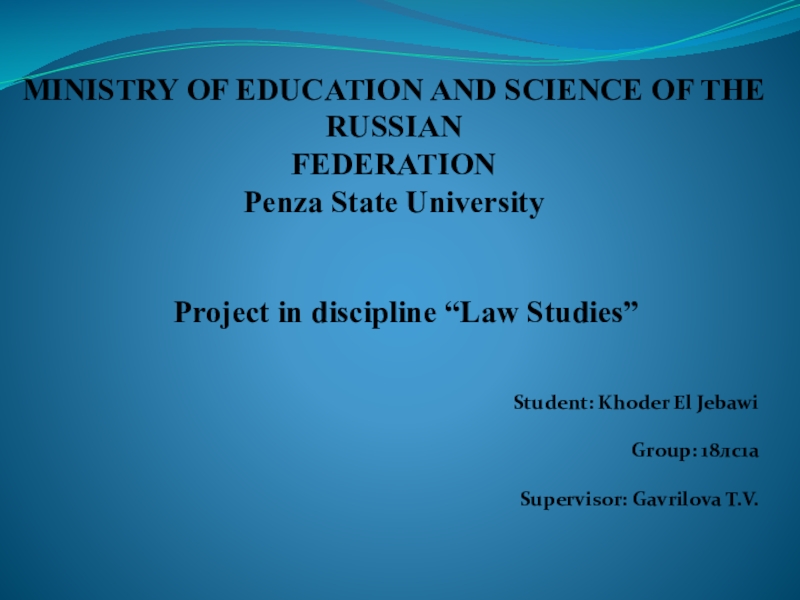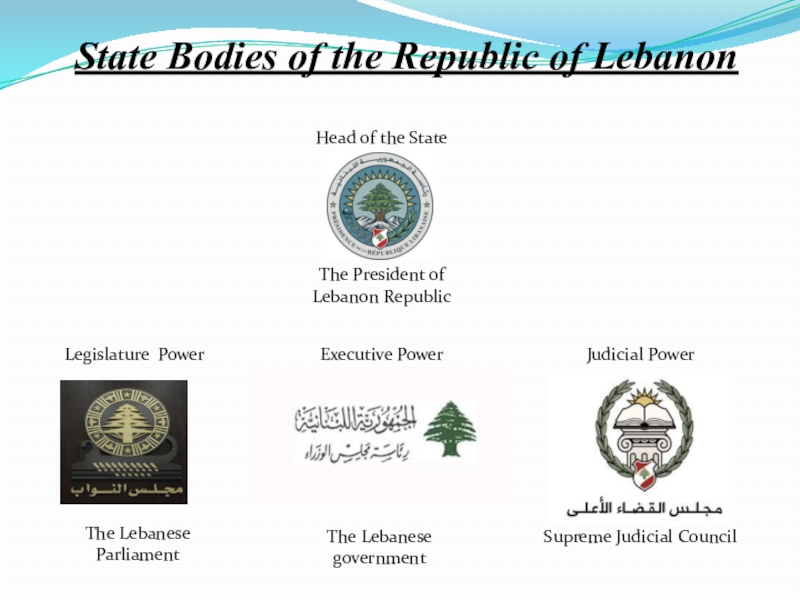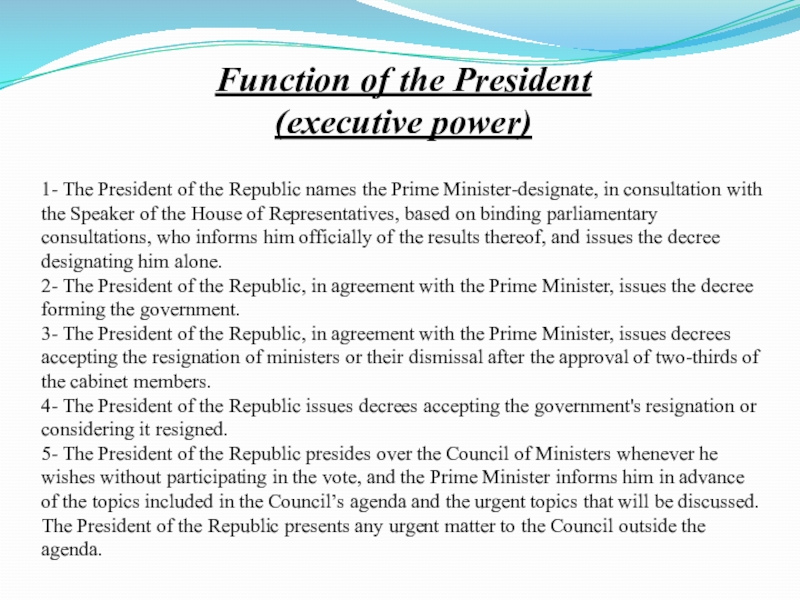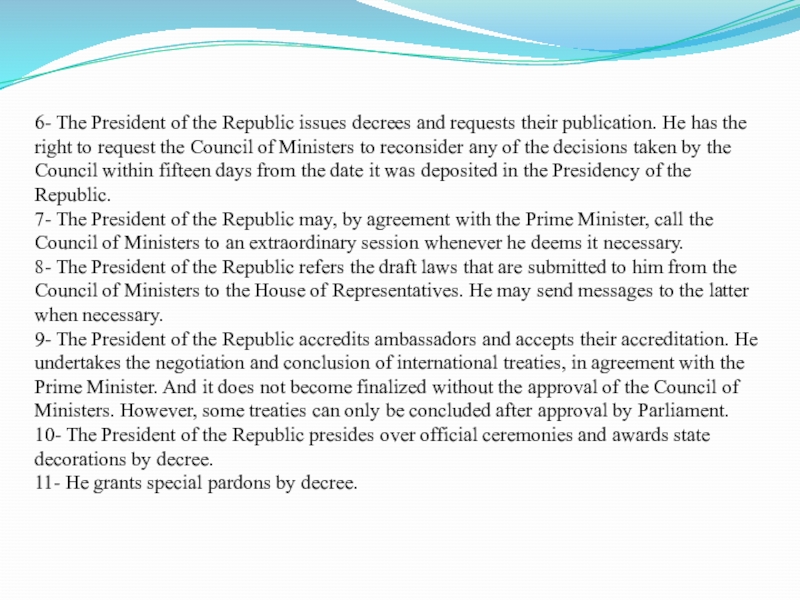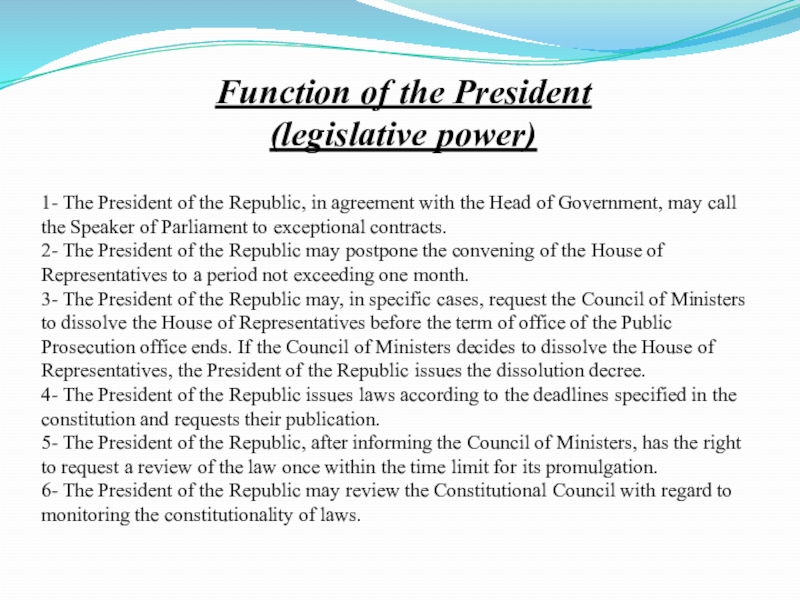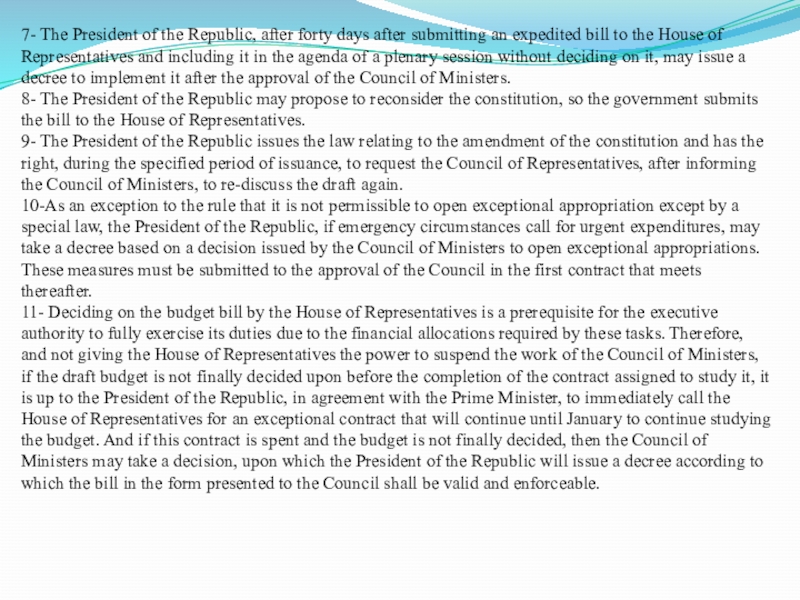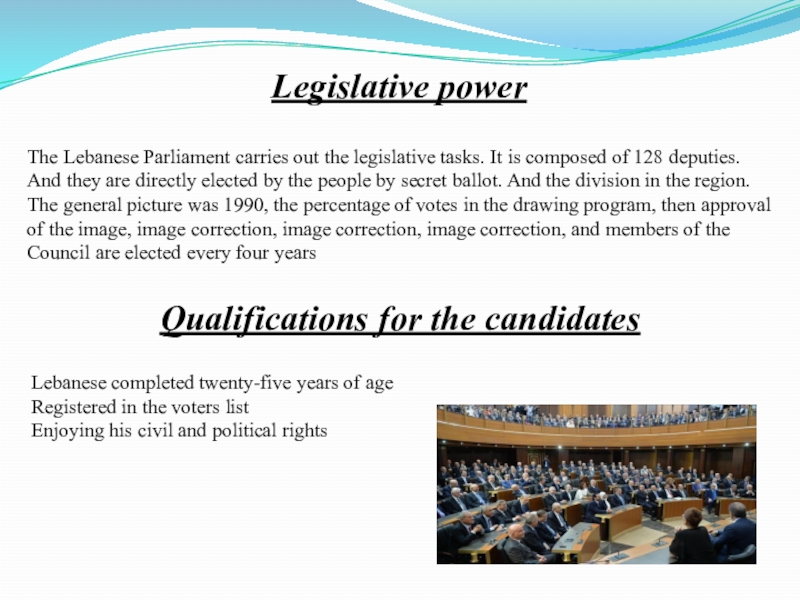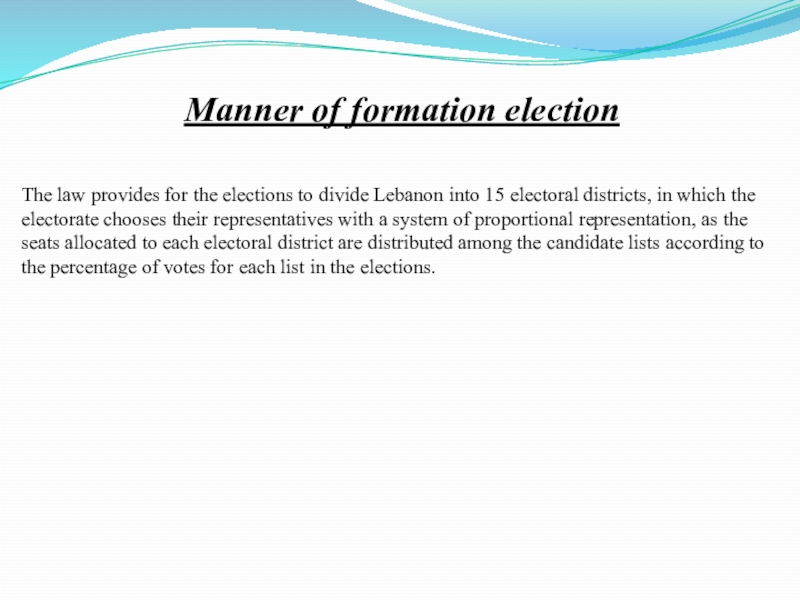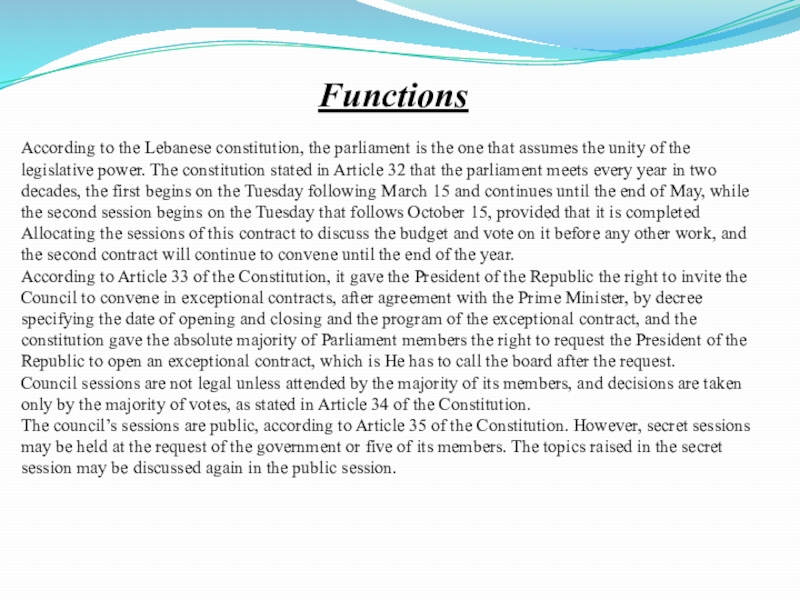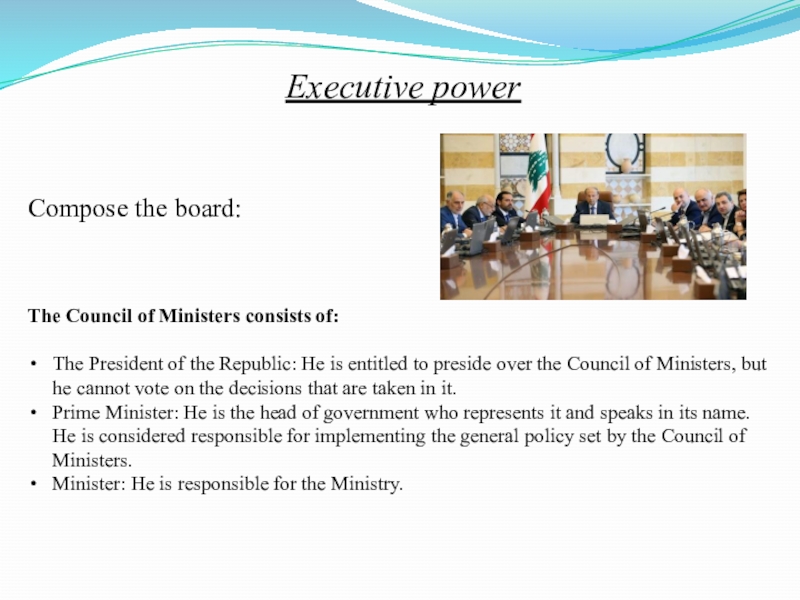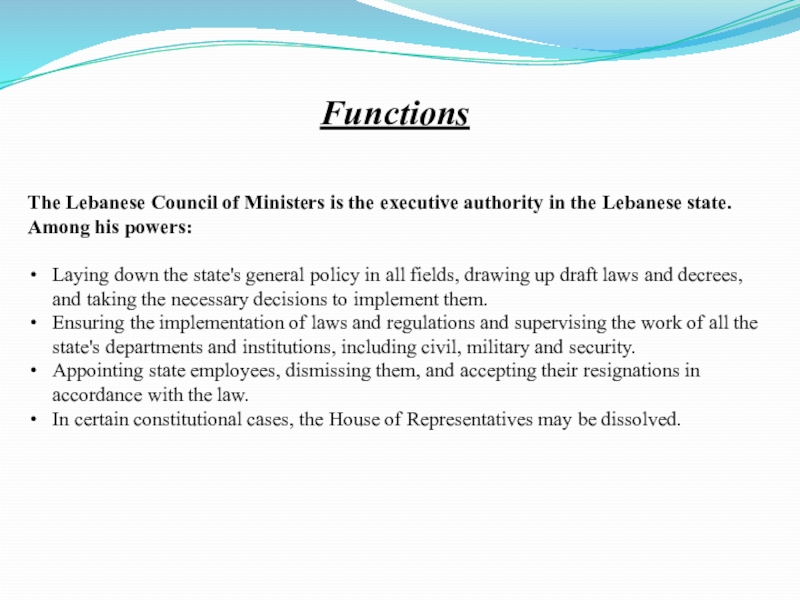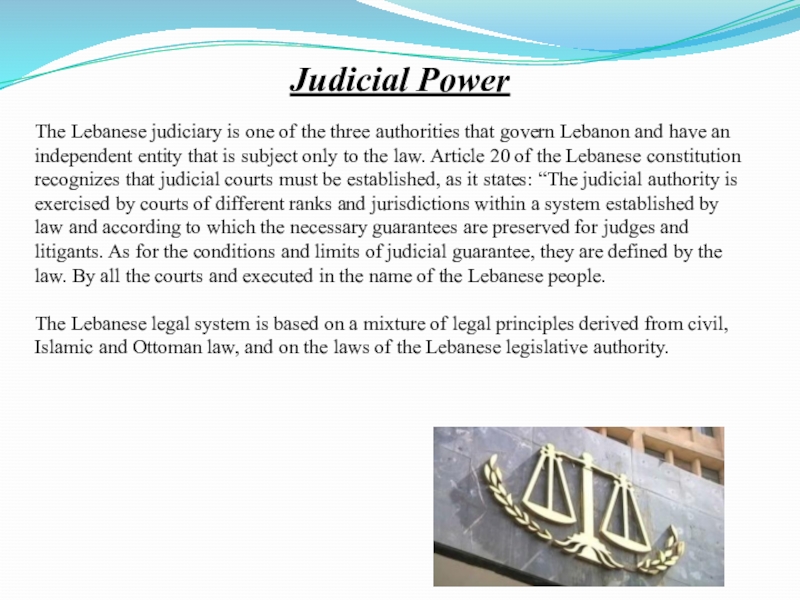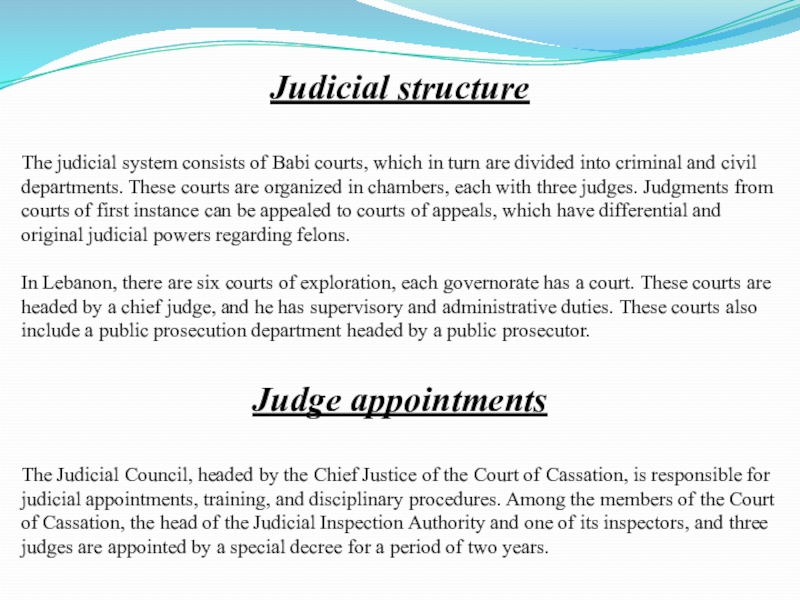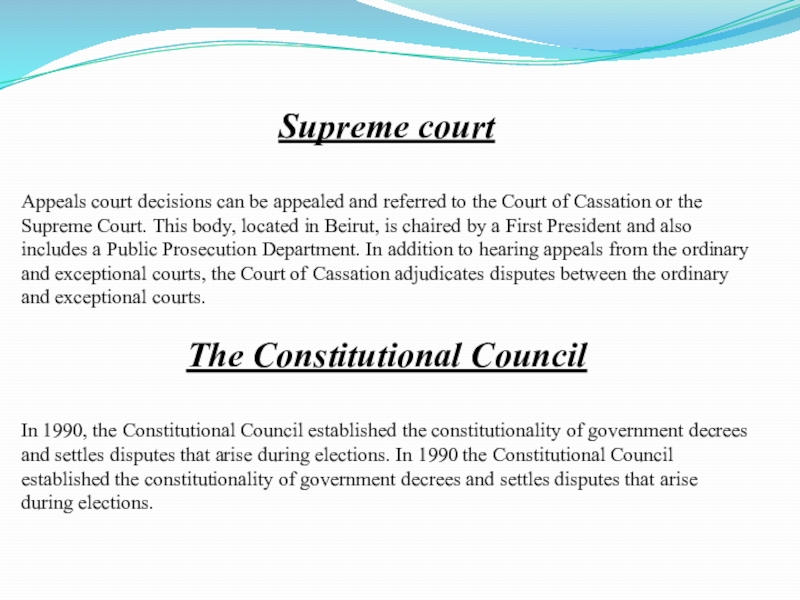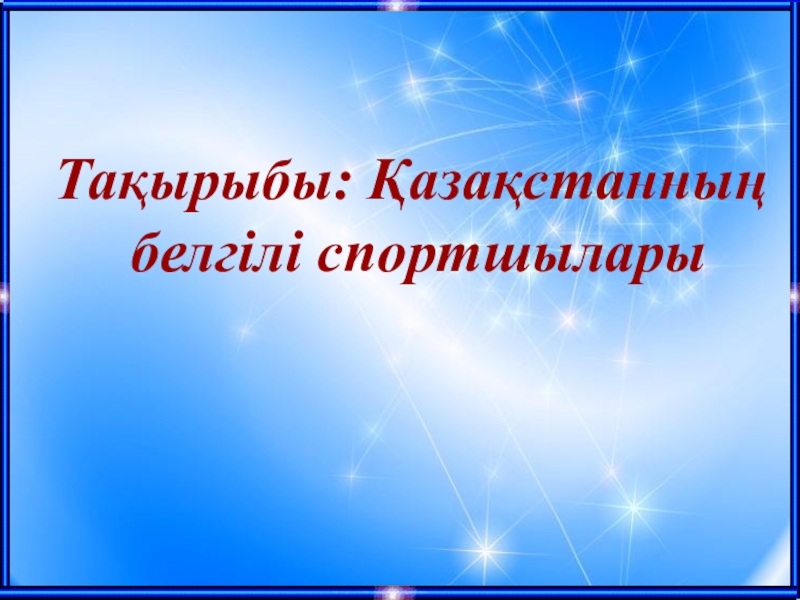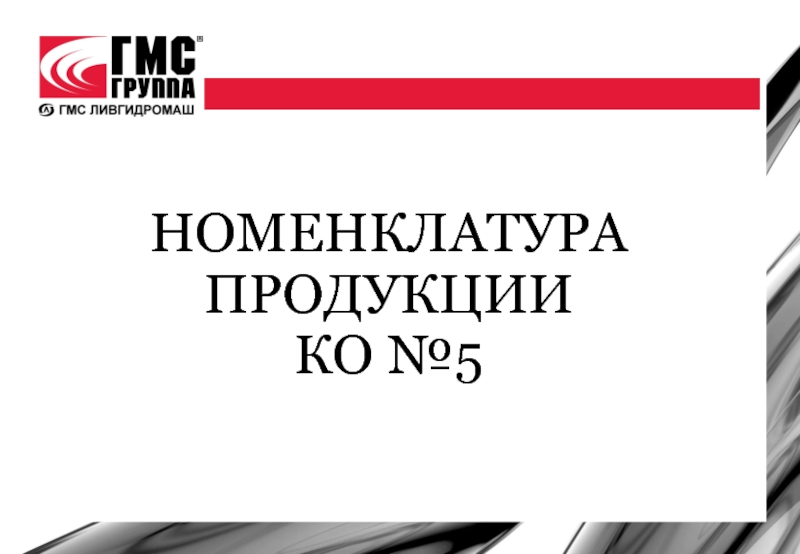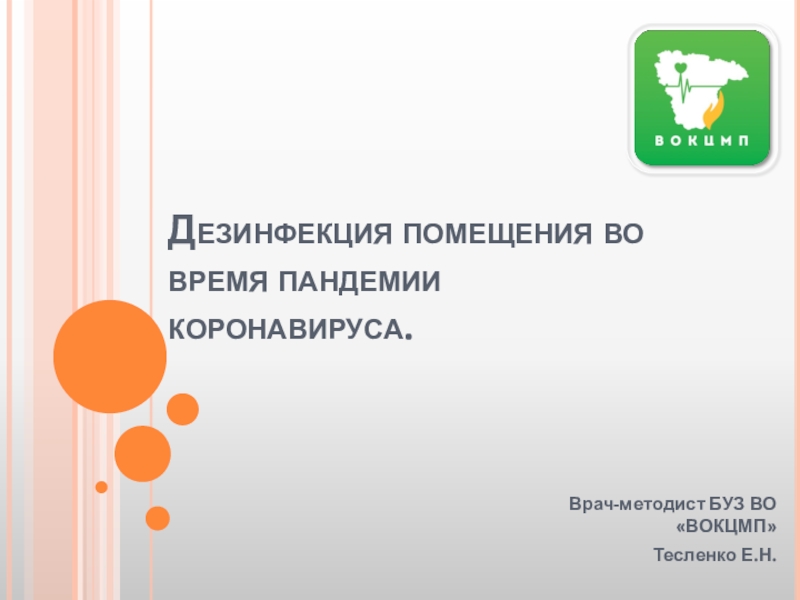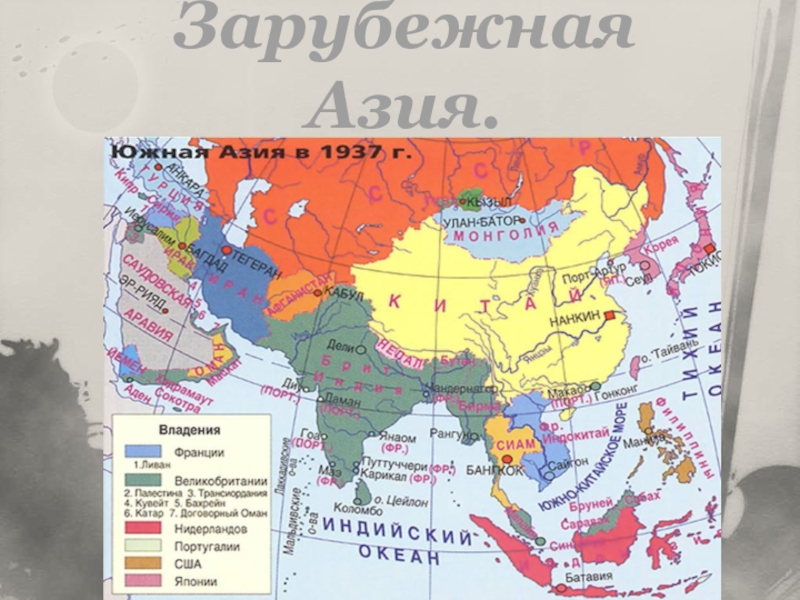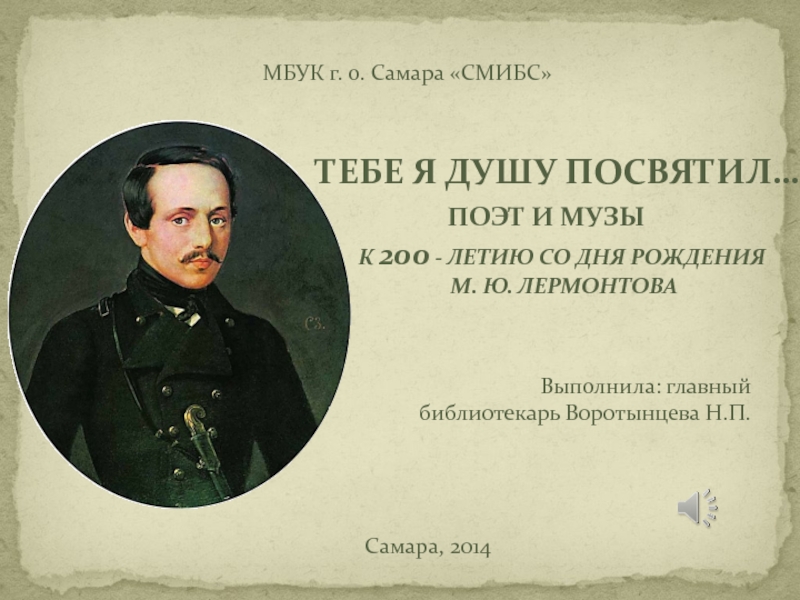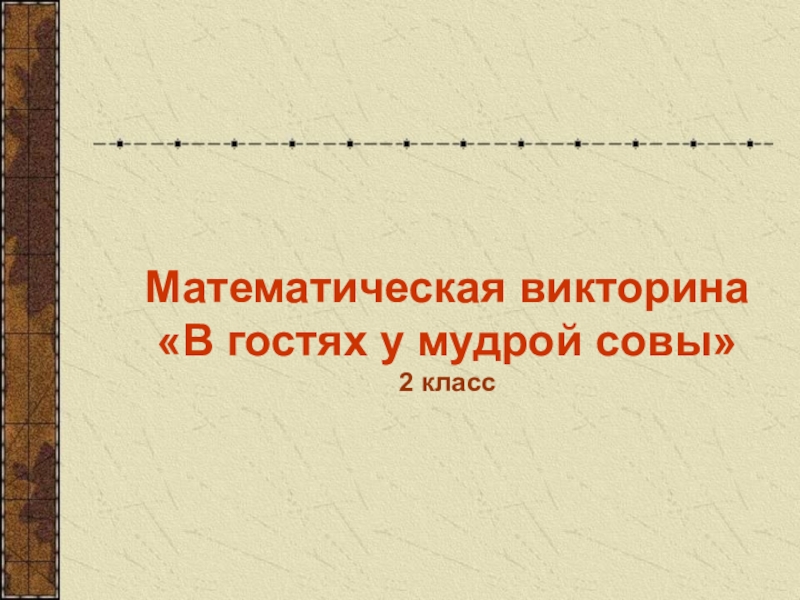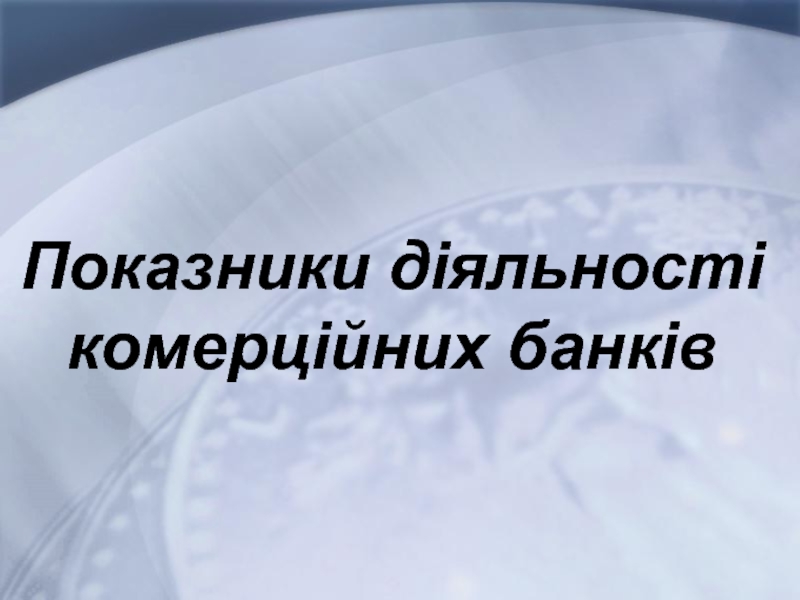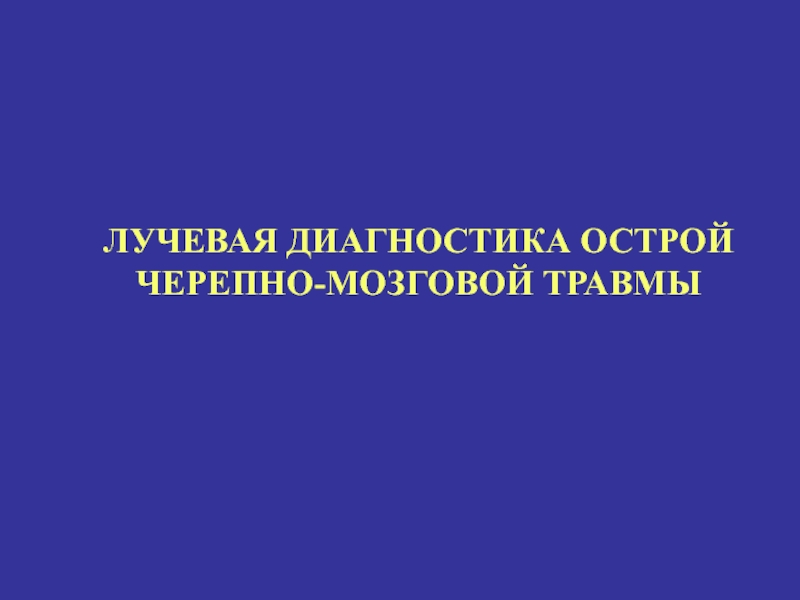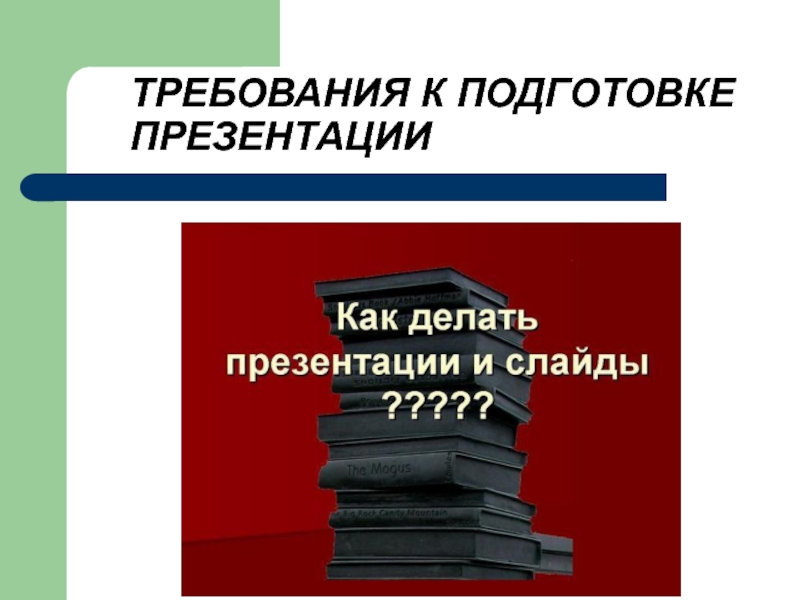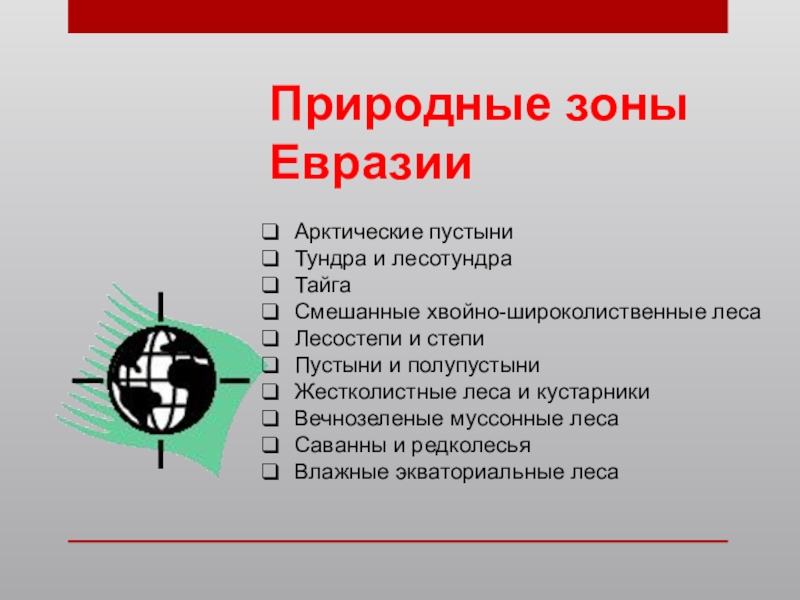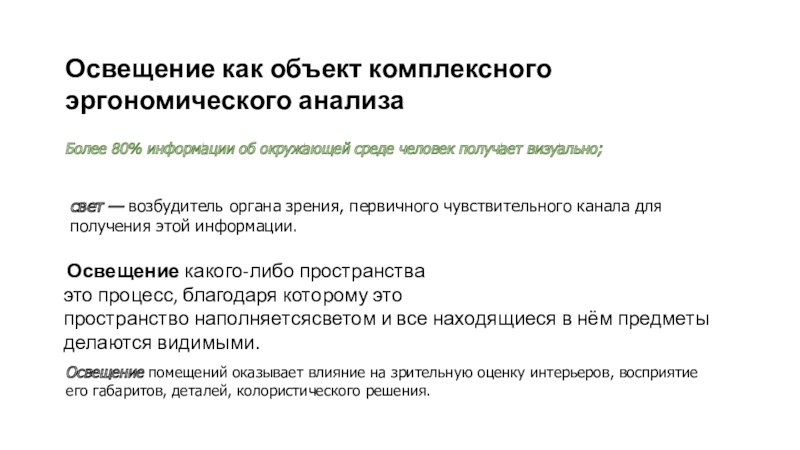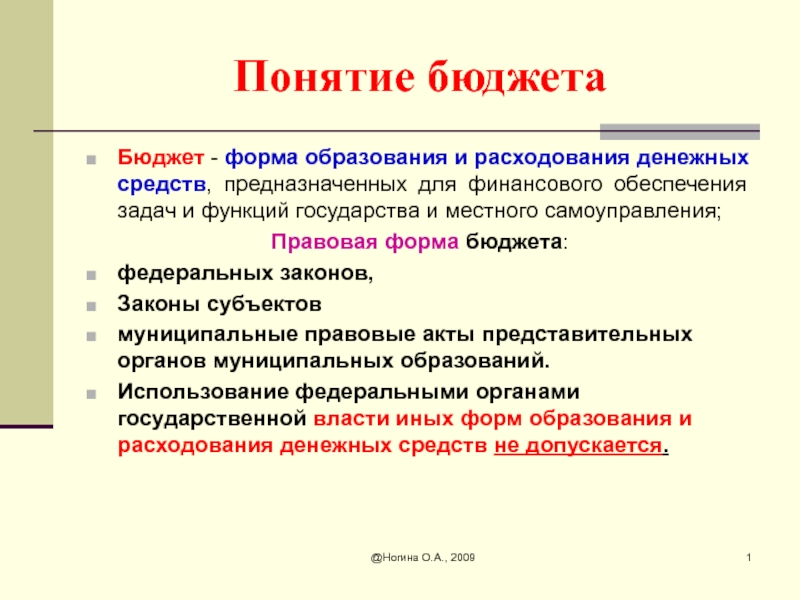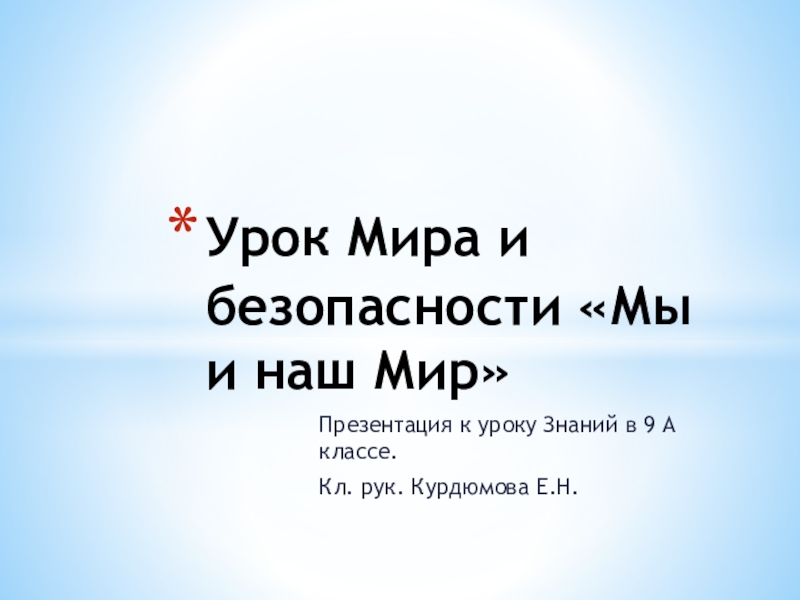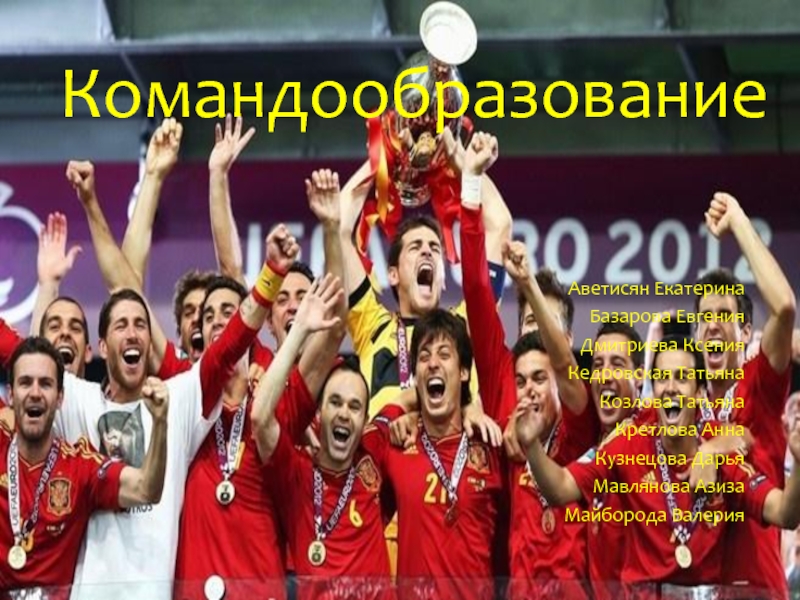Разделы презентаций
- Разное
- Английский язык
- Астрономия
- Алгебра
- Биология
- География
- Геометрия
- Детские презентации
- Информатика
- История
- Литература
- Математика
- Медицина
- Менеджмент
- Музыка
- МХК
- Немецкий язык
- ОБЖ
- Обществознание
- Окружающий мир
- Педагогика
- Русский язык
- Технология
- Физика
- Философия
- Химия
- Шаблоны, картинки для презентаций
- Экология
- Экономика
- Юриспруденция
MINISTRY OF EDUCATION AND SCIENCE OF THE RUSSIAN FEDERATION Penza State
Содержание
- 1. MINISTRY OF EDUCATION AND SCIENCE OF THE RUSSIAN FEDERATION Penza State
- 2. State Bodies of the Republic of LebanonHead
- 3. The President Of Lebanon RepublicQualifications:Citizen10 years residenceA Maronite ChristianMichel Aoun
- 4. The method of electing the president:The President
- 5. Function of the President (executive power)1- The
- 6. 6- The President of the Republic issues
- 7. Function of the President (legislative power)1- The
- 8. 7- The President of the Republic, after
- 9. Legislative powerThe Lebanese Parliament carries out the
- 10. Manner of formation electionThe law provides for
- 11. FunctionsAccording to the Lebanese constitution, the parliament
- 12. Executive powerCompose the board:The Council of Ministers
- 13. FunctionsThe Lebanese Council of Ministers is the
- 14. Judicial PowerThe Lebanese judiciary is one of
- 15. Judicial structureThe judicial system consists of Babi
- 16. Supreme courtAppeals court decisions can be appealed
- 17. Скачать презентанцию
Слайды и текст этой презентации
Слайд 1MINISTRY OF EDUCATION AND SCIENCE OF THE RUSSIAN
FEDERATION
Penza State University
Project
in discipline “Law Studies”
Слайд 2State Bodies of the Republic of Lebanon
Head of the State
The
President of Lebanon Republic
Legislature Power
Executive Power
Judicial Power
The Lebanese Parliament
The Lebanese
governmentSupreme Judicial Council
Слайд 3The President Of Lebanon Republic
Qualifications:
Citizen
10 years residence
A Maronite Christian
Michel Aoun
Слайд 4The method of electing the president:
The President of the Republic
is elected by secret ballot by a two-thirds majority of
the House of Representatives in the first session, and an absolute majority is satisfied in the following voting rounds. His presidency will last for six years, and he may not be re-elected until six years after the end of his term. This condition was violated during the reign of President Bechara El-Khoury, President Elias Hrawi and President Emile Lahoud, as they were extended for half a presidential term after amending the constitution.Слайд 5Function of the President
(executive power)
1- The President of the
Republic names the Prime Minister-designate, in consultation with the Speaker
of the House of Representatives, based on binding parliamentary consultations, who informs him officially of the results thereof, and issues the decree designating him alone.2- The President of the Republic, in agreement with the Prime Minister, issues the decree forming the government.
3- The President of the Republic, in agreement with the Prime Minister, issues decrees accepting the resignation of ministers or their dismissal after the approval of two-thirds of the cabinet members.
4- The President of the Republic issues decrees accepting the government's resignation or considering it resigned.
5- The President of the Republic presides over the Council of Ministers whenever he wishes without participating in the vote, and the Prime Minister informs him in advance of the topics included in the Council’s agenda and the urgent topics that will be discussed. The President of the Republic presents any urgent matter to the Council outside the agenda.
Слайд 66- The President of the Republic issues decrees and requests
their publication. He has the right to request the Council
of Ministers to reconsider any of the decisions taken by the Council within fifteen days from the date it was deposited in the Presidency of the Republic.7- The President of the Republic may, by agreement with the Prime Minister, call the Council of Ministers to an extraordinary session whenever he deems it necessary.
8- The President of the Republic refers the draft laws that are submitted to him from the Council of Ministers to the House of Representatives. He may send messages to the latter when necessary.
9- The President of the Republic accredits ambassadors and accepts their accreditation. He undertakes the negotiation and conclusion of international treaties, in agreement with the Prime Minister. And it does not become finalized without the approval of the Council of Ministers. However, some treaties can only be concluded after approval by Parliament.
10- The President of the Republic presides over official ceremonies and awards state decorations by decree.
11- He grants special pardons by decree.
Слайд 7Function of the President
(legislative power)
1- The President of the
Republic, in agreement with the Head of Government, may call
the Speaker of Parliament to exceptional contracts.2- The President of the Republic may postpone the convening of the House of Representatives to a period not exceeding one month.
3- The President of the Republic may, in specific cases, request the Council of Ministers to dissolve the House of Representatives before the term of office of the Public Prosecution office ends. If the Council of Ministers decides to dissolve the House of Representatives, the President of the Republic issues the dissolution decree.
4- The President of the Republic issues laws according to the deadlines specified in the constitution and requests their publication.
5- The President of the Republic, after informing the Council of Ministers, has the right to request a review of the law once within the time limit for its promulgation.
6- The President of the Republic may review the Constitutional Council with regard to monitoring the constitutionality of laws.
Слайд 87- The President of the Republic, after forty days after
submitting an expedited bill to the House of Representatives and
including it in the agenda of a plenary session without deciding on it, may issue a decree to implement it after the approval of the Council of Ministers.8- The President of the Republic may propose to reconsider the constitution, so the government submits the bill to the House of Representatives.
9- The President of the Republic issues the law relating to the amendment of the constitution and has the right, during the specified period of issuance, to request the Council of Representatives, after informing the Council of Ministers, to re-discuss the draft again.
10-As an exception to the rule that it is not permissible to open exceptional appropriation except by a special law, the President of the Republic, if emergency circumstances call for urgent expenditures, may take a decree based on a decision issued by the Council of Ministers to open exceptional appropriations. These measures must be submitted to the approval of the Council in the first contract that meets thereafter.
11- Deciding on the budget bill by the House of Representatives is a prerequisite for the executive authority to fully exercise its duties due to the financial allocations required by these tasks. Therefore, and not giving the House of Representatives the power to suspend the work of the Council of Ministers, if the draft budget is not finally decided upon before the completion of the contract assigned to study it, it is up to the President of the Republic, in agreement with the Prime Minister, to immediately call the House of Representatives for an exceptional contract that will continue until January to continue studying the budget. And if this contract is spent and the budget is not finally decided, then the Council of Ministers may take a decision, upon which the President of the Republic will issue a decree according to which the bill in the form presented to the Council shall be valid and enforceable.
Слайд 9Legislative power
The Lebanese Parliament carries out the legislative tasks. It
is composed of 128 deputies. And they are directly elected
by the people by secret ballot. And the division in the region. The general picture was 1990, the percentage of votes in the drawing program, then approval of the image, image correction, image correction, image correction, and members of the Council are elected every four yearsLebanese completed twenty-five years of age
Registered in the voters list
Enjoying his civil and political rights
Qualifications for the candidates
Слайд 10Manner of formation election
The law provides for the elections to
divide Lebanon into 15 electoral districts, in which the electorate
chooses their representatives with a system of proportional representation, as the seats allocated to each electoral district are distributed among the candidate lists according to the percentage of votes for each list in the elections.Слайд 11Functions
According to the Lebanese constitution, the parliament is the one
that assumes the unity of the legislative power. The constitution
stated in Article 32 that the parliament meets every year in two decades, the first begins on the Tuesday following March 15 and continues until the end of May, while the second session begins on the Tuesday that follows October 15, provided that it is completed Allocating the sessions of this contract to discuss the budget and vote on it before any other work, and the second contract will continue to convene until the end of the year.According to Article 33 of the Constitution, it gave the President of the Republic the right to invite the Council to convene in exceptional contracts, after agreement with the Prime Minister, by decree specifying the date of opening and closing and the program of the exceptional contract, and the constitution gave the absolute majority of Parliament members the right to request the President of the Republic to open an exceptional contract, which is He has to call the board after the request.
Council sessions are not legal unless attended by the majority of its members, and decisions are taken only by the majority of votes, as stated in Article 34 of the Constitution.
The council’s sessions are public, according to Article 35 of the Constitution. However, secret sessions may be held at the request of the government or five of its members. The topics raised in the secret session may be discussed again in the public session.
Слайд 12Executive power
Compose the board:
The Council of Ministers consists of:
The President
of the Republic: He is entitled to preside over the
Council of Ministers, but he cannot vote on the decisions that are taken in it.Prime Minister: He is the head of government who represents it and speaks in its name. He is considered responsible for implementing the general policy set by the Council of Ministers.
Minister: He is responsible for the Ministry.
Слайд 13Functions
The Lebanese Council of Ministers is the executive authority in
the Lebanese state. Among his powers:
Laying down the state's general
policy in all fields, drawing up draft laws and decrees, and taking the necessary decisions to implement them.Ensuring the implementation of laws and regulations and supervising the work of all the state's departments and institutions, including civil, military and security.
Appointing state employees, dismissing them, and accepting their resignations in accordance with the law.
In certain constitutional cases, the House of Representatives may be dissolved.
Слайд 14Judicial Power
The Lebanese judiciary is one of the three authorities
that govern Lebanon and have an independent entity that is
subject only to the law. Article 20 of the Lebanese constitution recognizes that judicial courts must be established, as it states: “The judicial authority is exercised by courts of different ranks and jurisdictions within a system established by law and according to which the necessary guarantees are preserved for judges and litigants. As for the conditions and limits of judicial guarantee, they are defined by the law. By all the courts and executed in the name of the Lebanese people.The Lebanese legal system is based on a mixture of legal principles derived from civil, Islamic and Ottoman law, and on the laws of the Lebanese legislative authority.
Слайд 15Judicial structure
The judicial system consists of Babi courts, which in
turn are divided into criminal and civil departments. These courts
are organized in chambers, each with three judges. Judgments from courts of first instance can be appealed to courts of appeals, which have differential and original judicial powers regarding felons.In Lebanon, there are six courts of exploration, each governorate has a court. These courts are headed by a chief judge, and he has supervisory and administrative duties. These courts also include a public prosecution department headed by a public prosecutor.
Judge appointments
The Judicial Council, headed by the Chief Justice of the Court of Cassation, is responsible for judicial appointments, training, and disciplinary procedures. Among the members of the Court of Cassation, the head of the Judicial Inspection Authority and one of its inspectors, and three judges are appointed by a special decree for a period of two years.
Слайд 16Supreme court
Appeals court decisions can be appealed and referred to
the Court of Cassation or the Supreme Court. This body,
located in Beirut, is chaired by a First President and also includes a Public Prosecution Department. In addition to hearing appeals from the ordinary and exceptional courts, the Court of Cassation adjudicates disputes between the ordinary and exceptional courts.The Constitutional Council
In 1990, the Constitutional Council established the constitutionality of government decrees and settles disputes that arise during elections. In 1990 the Constitutional Council established the constitutionality of government decrees and settles disputes that arise during elections.
